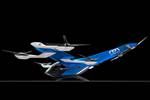Airbus commits to A320 rate increase among persisting supply chain concerns
Intentions to increase rates to 75 aircraft per month over the next three years reflects Airbus’ confidence in its Q1 performance, commercial aircraft demand and the ability for the supply chain to manage the ramp up.
A320neo Eurowings takeoff. Photo Credit: Airbus SAS 2022
Airbus (Toulouse, France) has confirmed its intentions to to 75 aircraft per month over the next three years. The proposal comes despite the company facing warnings and pushback from some suppliers over previous plans to boost A320 production to 65 by summer 2023 due to persisting supply chain concerns.
According to Aviation Weekly, work for the additional 10 aircraft will be spread across all of its sites, but its Mobile, Alabama, facility will be expanded to include a second A320neo-family final assembly line (learn more in this ). All sites will be made capable of building A321neos, and that aircraft’s production share is expected to continue to rise.
“We see continuing strong growth in commercial aircraft demand driven by the A320 family,” says Airbus CEO Guillaume Faury. Airbus has shared its plans with engine manufacturers and is “confident in the supply chain being able to manage” the ramp up, he says, noting that the company has assessed a large number of suppliers with “feedback that tells us [the rate increase] is possible.”
suggests that the company’s confidence partially resides in a supply deal with engine makers Safran (Paris, France) and MTU (Munich, Germany) in May, which will run through 2024. The manufacturer’s pre-COVID record for A320 production was 60 jets a month.
Airbus will introduce the ramp up “progressively,” Faury says, but adds that giving precise monthly delivery figures for 2024-25 would be “premature.” He points out that a “lot of challenges” remain in the short term — including the continuing recovery from the pandemic — which bring complexity to the supply chain, and indicates that, while there are no significant departures in quality, the ability of suppliers to deliver on time is “changing tremendously.”
In its latest Q1 2022 report, Airbus announced “solid performance across our commercial aircraft, helicopter and defense businesses” and a forecast of 720 commercial aircraft deliveries by end of year. Despite the delay to the A321XLR, Airbus hopes its increased A320 output will help it further cement its position over Boeing (Chicago, Ill., U.S.) as the leader of the narrowbody market.
Related Content
-
Industrializing additive manufacturing in the defense/aerospace sector
GA-ASI demonstrates a path forward for the use of additive technologies for composite tooling, flight-qualified parts.
-
Plant tour: Aernnova Composites, Toledo and Illescas, Spain
RTM and ATL/AFP high-rate production sites feature this composites and engineering leader’s continued push for excellence and innovation for future airframes.
-
Otto Aviation launches Phantom 3500 business jet with all-composite airframe from Leonardo
Promising 60% less fuel burn and 90% less emissions using SAF, the super-laminar flow design with windowless fuselage will be built using RTM in Florida facility with certification slated for 2030.






